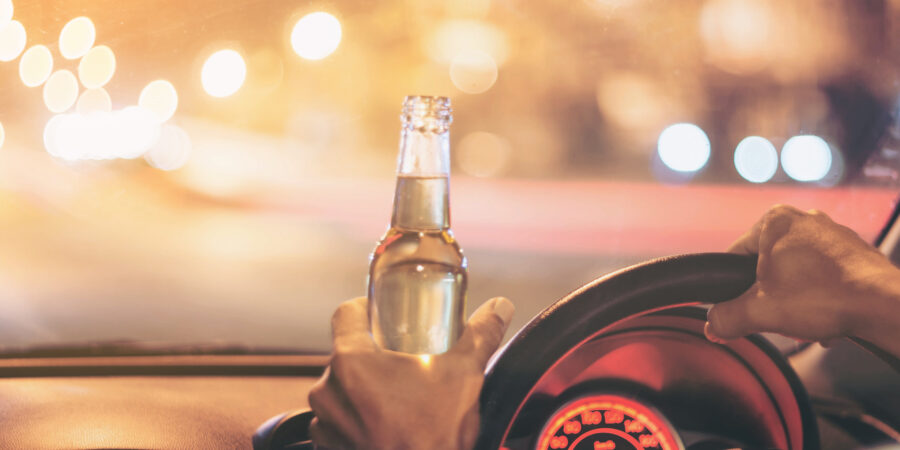Drunk Driving: Statistics and Consequences
In all states, it is illegal for drivers over the age of 21 to have a blood-alcohol concentration, or BAC, above .08. However, a BAC above .05 is illegal in Utah, and there are special requirements for people under the age of 21 and those who hold a commercial driver’s license. When a person’s BAC is high, driving is dangerous because of how alcohol impairs thinking and slows reactions. States and organizations that advocate for roadway safety are fighting to improve measures to reduce the number of accidents that happen due to alcohol impairment. Sobriety checkpoints, interlock devices and stricter laws are a few examples of ways they are trying to make a difference. It is important for people of all ages to understand the risks and consequences of alcohol impaired-driving to avoid getting a DUI. Also, it helps to know what to do if you are injured in an accident because of someone driving drunk.
Drunk Driving Statistics
According to the CDC, 29 people die every day in the United States because of drivers who are intoxicated. Alcohol-impaired driving accidents cost the country more than $44 billion annually. In 2018, 12.6 million Americans admitted to driving under the influence of alcohol or drugs. The National Highway Traffic Safety Administration reported 10,142 fatalities due to alcohol-related accidents in 2019.
The NHTSA says that car accidents are the most common cause of death among teenagers. About 25% of those accidents involve alcohol. Among drivers between the ages of 15 and 20 who died in car accidents in 2019, 24% had a BAC of .01 or more. According to 2019 reports published by the NHTSA, 27% of drunk drivers between the ages of 15 and 20 had a BAC exceeding .08. The 25 to 34 age group ranked second at 25%. Additionally, the NHTSA found that men were more likely to be involved in alcohol-impaired accidents. The organization’s data showed that there were four males for every female reported in alcohol-related accidents in 2019.
Consequences of Drunk Driving
There are many potential consequences of driving while under the influence of alcohol. If a person is caught, the individual will be arrested. The severity of consequences depends on multiple factors. For example, someone may face more severe consequences if that person already had a DUI in the past. Also, if the person injures someone else while driving drunk, the drunk driver may be liable for the injured person’s medical bills. We will discuss different types of driving under the influence charges and injuries more in upcoming sections. Some people are ordered to take classes, go to rehab or complete a certain number of hours of community service. Others may be sent to jail and face fines. If a person is convicted of any felony charges related to the incident, they can negatively impact that individual’s future. It can be harder to get better jobs, rent a property and more.
Types of DUIs
If someone is charged with driving under the influence in California, there are several potential outcomes. They depend on previous charges and other factors. These are the main types of DUIs in California.
Wet Reckless
Sometimes, the prosecution and the attorney for the defendant may agree to a reduced charge. This means that the initial charge is changed to something else, such as reckless driving with alcohol involvement. If that happens, it may be referred to as a “wet reckless.” When a person pleads to this charge, it may not include jail time. Fines, driving under the influence classes and probation may be ordered instead. While this may sound like an easy way to escape a driving under the influence conviction, it is not. If a person has a wet reckless charge and pleads guilty, it will count as a DUI if the individual is arrested again for driving drunk in the future.
First Offense
When someone is arrested for driving under the influence for the first time, there may or may not be jail time involved. Based on circumstances in individual cases, judges may decide to order community service or something else. A person may have to use an interlocking ignition device in the vehicle. In some cases, a person’s license may be suspended. Also, there is a possibility of having to pay up to $1,000 in fines.
Second Offense
When a person is arrested for driving under the influence a second time within a decade of the first arrest, it is typically a misdemeanor crime. The person must usually pay fines and penalties that total up to $2,000. There may be between 10 days and a year of jail time. License suspension is often ordered and may last for two years. Classes, interlocking ignition devices or rehab may also be ordered in some cases.
Third Offense
If someone is arrested for the third time in 10 years with driving under the influence charges, the crime is still typically a misdemeanor. There may be between 120 days and a year of jail. Penalties and fines up to $3,000 may be ordered. The period for license revocation is three years. A person must take court-ordered classes for about a year and a half. Rehab or an interlocking ignition device may also be ordered by the judge.
Fourth Offense and Felony Offense
The fourth time someone is arrested for driving under the influence within 10 years of the first time, the crime is a felony. Also, it is a felony if the person who is drunk and causes the accident injures or kills someone. That is true whether it is a first, second, third or fourth offense. Felony convictions that cause the death or injury of another person lead to at least 180 days in jail or up to 10 years in prison. There may be fines greater than $3,000, and license revocation is for four years. Additionally, the person must take classes for as long as the judge orders.
Commercial Offense
A person who has a CDL is held to strict standards when it comes to driving under the influence. At .04, the BAC limit is much lower than it is for a regular vehicle driver. The first time someone is arrested for alcohol-impaired driving with a CDL, the penalties can include license loss for at least a year. If there is a second offense, it can lead to permanent loss of a CDL. Depending on the circumstances, there may be rehab or other requirements as well. Potential jail time for a first offense with a CDL may be up to six months, but there may not be jail time. With a second offense, jail time may be between a few days and up to a year. There are also fines.
Under 21 Offense
California has a zero-tolerance policy for underage drinking. Because of this, people who are under the age of 21 and arrested for alcohol-impaired driving face strict penalties. Additionally, they cannot have a BAC higher than .01. Underage drivers who drive under the influence lose their license for a year. They may also face fines, probation, jail time and court-ordered classes for alcohol impaired-driving. They also face strict penalties for having sealed alcohol containers in the car since that is illegal possession of alcohol.
Understanding Legal Liabilities of Driving Drunk
According to California law, drunk drivers who injure or kill others are responsible for their actions. In addition to the criminal charges mentioned earlier in the section about felony offenses, a person who injures someone else may face civil penalties. This means that an injured party may file a lawsuit to collect money for damages, and the defendant may lose assets. When the police arrest someone who causes an accident and confirm that the person was driving drunk, it helps establish a case of negligence. If a person’s injuries are permanent and severe, the driver who caused them may be ordered to pay a significant sum. The responsible person will still have to complete any jail time, probation or other court orders. Civil and criminal cases are separate.
What To Do if You Were Injured by a Drunk Driver
If someone who was driving drunk injured you or a loved one, it is important to work with a personal injury attorney who understands all applicable California laws. Our firm handles a wide variety of vehicle accident cases caused by negligence. We can also help if your loved one died because of another driver’s carelessness. The team at JT Legal Group has represented many victims of senseless accidents that were caused by drunk drivers. People who are injured need legal representation to ensure a fair settlement that compensates them for loss of abilities, lost wages and more. Please contact us for a free consultation with a personal injury attorney.


